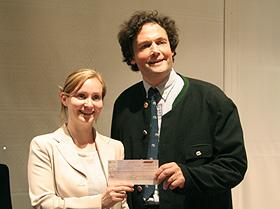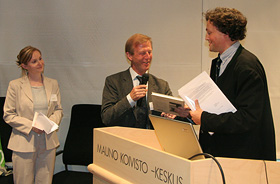Ladies and Gentlemen,
Dear Rectors, Professors and Students from the Coimbra Group
It is a great pleasure and a great honour to be with you today to launch the Arenberg-Coimbra Group Erasmus Prize thanks to the efforts of former Belgian Minister of State Mark Eyskens, Professor Guido Langouche from the Catholic University of Leuven and Ms Inge Knudsen and her dedicated Coimbra Group team based in Brussels.
The Arenberg-Coimbra Prize is a contribution to the construction of Europe and to the expansion of knowledge in every field of activity.
Every year, all 37 members of the Coimbra Group can designate three candidates per university to apply for the Prize.
The winner is the one who can convince the jury in four pages that his or her stay abroad within the Erasmus exchange program contributed significantly to his or her master thesis or doctorate.
Last year, on the occasion of the award of our History Prizes ‘Duke d’Arenberg’ in Brussels, Commission President José Barroso gave an excellent speech about Europe in which his point was that our future lies in our own hands.
Earlier this year, former German Chancellor Helmut Kohl was in Lausanne, Switzerland, to receive the Gold Medal from the Jean Monnet Foundation for Europe where he reminded his audience that the major achievement of the European Economic Community had been – for his generation – to establish peace between countries that had been at war with each other only a few years before, a peace which our generation takes for granted.
Indeed, if we look back fifty years – March 25 th, 1957 was the beginning of the E.E.C – progress has since then been mind-boggling.
The six founding states, the Benelux, France, Germany and Italy have been joined by another 21 member states and others are lining up to become members in the future.
A huge common market has now become a reality with more than 500 million consumers. We have a common currency, the EURO, that became very rapidly a world reserve currency with the USD and tomorrow the Renminbi.
But our leaders and many of us know very well that we have to move on.
Indeed, we have to become the United States of Europe in a changing world, soon to be dominated by six heavyweights, namely USA, China, India, Brazil, may-be a new ‘imperial’ Russia and us.
The next steps will be to have a European foreign minister, a truly European government and one day a President of the United States of Europe, a federal construction that could take the shape of the Holy Roman Empire, of Federal Germany or of tiny Switzerland, where two religions and four languages work and live together in harmony and prosperity not because of ‘multiculturalism’ but because of ‘interculturalism’, rooted geographically and culturally, and ruled by popular will, regularly expressed in referenda.
Another very important step is to have a common European defence, a dream that will take some time to become true as well.
Although the media and we ourselves often prefer to see only the negative sides, and ‘Europessimism’ often seems to be spreading, there are positive developments and initiatives.
The activities of the Coimbra Group as well as the Erasmus Programme of the European Commission are just one type of tangible proof of the fantastic progress Europe is making. To our family, these are very good reasons to back intelligent initiatives.
As Commission President Barroso said last September, our future is in our own hands and it is up to us to help our elected leaders to get there.
In advanced, post-industrialized democracies like ours, the top-down approach can only work if there is a bottom-up response emanating from the citizens.
We need a new European identity, respectful of our cultural and linguistic differences, rooted in a common understanding of the historical and geographical diversity of our continent which can allow our collective identities to thrive peacefully.
We need an openness to the world and its new challenges.
‘Europe is the only game in town’, even if large sections of our populations still don’t get the message. There is no alternative or we shall disappear and with us, our cultures and our specificities.
Indeed, there is much more at stake than money, the economy and our current well-being. This is about us shaping our future and our destinies instead of letting others shape them for us. This is the real bottom line.
Too often we are letting events define the European construction and react to them instead of being wiser, pro-active and move ahead and shape events. History teaches us that but it is hard to listen.
One way of creating a European identity is to let it grow from concrete actions such as the Erasmus Programme. The original idea behind the programme was to create European citizens through exchanges and thus support the dissemination of the common social model. Thousands of students, indeed, over a million young Europeans, have had the Erasmus experience since the start twenty years ago. It is therefore also a special pleasure for me to award the Arenberg-Coimbra Group Erasmus Prize for the first time this year, thus marking the 20 th anniversary of the Erasmus Programme and the active contribution of the Coimbra Group universities to its success.
Concrete actions are also behind the many other activities of our family. There are, of course, limits to what one single family can do, but we have decided to do whatever we can to help out, modestly, yes, but we with determination and patience, putting our money where our mouth is.
We come from the heart of Europe, from the Low Countries, can trace our family back to the 6 th century AD, and we have lived under Burgundian, Spanish, Austrian, French, Dutch, German and Belgian rule.
We have a long history and a long memory and we have offered to share it with the public through the various activities undertaken by our family.
More than twenty years ago, we started foundations in different European countries to promote History and Culture in a truly European spirit.
Having more that one kilometre of archives going back to 911 AD, we have decided to make them accessible to the public. We also publish books, take part in exhibitions, organize conferences, fight in the courts for a museum open to the public, are promoting two historical routes linking different European countries and have set up two prize awards, the first being the History Prizes ‘Duke d’Arenberg’, awarded once every two years since 1992, and the second and now for the first time, the Arenberg-Coimbra Group Erasmus Prize.
I would like to invite you to contact us if you have ideas to develop activities to promote European culture and history – and if possible, some financial muscle to implement the ideas would also be welcome.
In the meantime, have a look at our website.
Today, it is a great pleasure for me to award the first Arenberg-Coimbra Group Erasmus Prize to Ms Mila Oiva from the University of Turku, one of our kind hosts. Ms Oiva studied at the Jagiellonian University in Krakow as part of her Finnish master degree. Congratulations to her and to the University of Turku for this Prize.
It has been a pleasure to have come here to support all of you and I look forward to many fruitful years of co-operation ahead of us.
Many thanks again to former Belgian Minister of State Mark Eyskens, Professor Guido Langouche, Ms Knudsen and our hosts here in Turku for having supported the project and made it happen.
Thank you for your attention
Prince Leopold d'Arenberg

